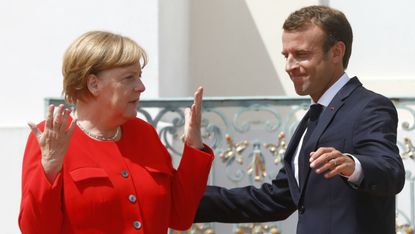Angela Merkel and Emmanuel Macron ‘open new eurozone chapter’
German chancellor backs French president's call for greater economic integration with landmark budget

Angela Merkel and Emmanuel Macron have agreed a landmark eurozone budget charged with boosting investment in the bloc and promoting economic convergence between its 19 states.
The French president has long advocated wide-ranging reforms to strengthen the eurozone and insulate the single currency union from future crises.
The centrist president was elected on a platform of strengthening the eurozone and promoting EU integration, and has staked his political future on being able to draw EU countries together politically and economically.
Subscribe to The Week
Escape your echo chamber. Get the facts behind the news, plus analysis from multiple perspectives.

Sign up for The Week's Free Newsletters
From our morning news briefing to a weekly Good News Newsletter, get the best of The Week delivered directly to your inbox.
From our morning news briefing to a weekly Good News Newsletter, get the best of The Week delivered directly to your inbox.
Last year, Macron laid out an ambitious plan for an integrated Europe, calling for a single defence budget, an EU defence force and a shared budget for eurozone countries.
While Europe’s economy has picked up and there is no immediate sign of financial stress, Reuters says “many analysts maintain that reforms are needed to protect the single currency”.
However, Merkel, who is wary of growing anti-EU sentiment at home and under pressure to curb migrant arrivals, has struck a more cautious approach to further EU integration, in the past opposing the idea of a significant eurozone budget because it would entail more risk sharing and fiscal transfers, says the Financial Times.
But while the proposals appear to fall short of Macron’s ambitious vision set out last year, in what appears a major victory the French president, the beleaguered Merkel said the budget agreement represented a “new chapter” for the eurozone.
“We are working to make sure that the eurozone budget will be used to strengthen investment, also with the aim of strengthening convergence within the euro zone,” she added. “Because we know that a economic and monetary union can only remain intact if economic policies converge.”
Details of the budget, including its amount and whether it would be financed by national sources or a bloc-wide tax, will now be hammered out by ministers before the end of the year.
Create an account with the same email registered to your subscription to unlock access.
Sign up for Today's Best Articles in your inbox
A free daily email with the biggest news stories of the day – and the best features from TheWeek.com
-
 Is there a peaceful way forward for Israel and Iran?
Is there a peaceful way forward for Israel and Iran?Today's Big Question Tehran has initially sought to downplay the latest Israeli missile strike on its territory
By Sorcha Bradley, The Week UK Published
-
 The Week Unwrapped: Sudan, tackling homelessness and fake news
The Week Unwrapped: Sudan, tackling homelessness and fake newsPodcast What is happening in Sudan? Could London really end rough sleeping? And why has Joe Lycett being making up stories?
By The Week Staff Published
-
 Taylor Swift's surprise double album: an event of 'world-shaking proportions'
Taylor Swift's surprise double album: an event of 'world-shaking proportions'Why Everyone's Talking About Fans are 'reeling' after The Tortured Poets Department is followed by The Anthology – 15 additional tracks
By Julia O'Driscoll, The Week UK Published
-
 Puffed rice and yoga: inside the collapsed tunnel where Indian workers await rescue
Puffed rice and yoga: inside the collapsed tunnel where Indian workers await rescueSpeed Read Workers trapped in collapsed tunnel are suffering from dysentery and anxiety over their rescue
By Sorcha Bradley, The Week UK Published
-
 Gaza hospital blast: What the video evidence shows about who's to blame
Gaza hospital blast: What the video evidence shows about who's to blameSpeed Read Nobody wants to take responsibility for the deadly explosion in the courtyard of Gaza's al-Ahli Hospital. Roll the tape.
By Peter Weber, The Week US Published
-
 Giraffe poo seized after woman wanted to use it to make a necklace
Giraffe poo seized after woman wanted to use it to make a necklaceTall Tales And other stories from the stranger side of life
By Chas Newkey-Burden, The Week UK Published
-
 Helicopter sound arouses crocodiles
Helicopter sound arouses crocodilesTall Tales And other stories from the stranger side of life
By Chas Newkey-Burden, The Week UK Published
-
 Woman sues Disney over 'injurious wedgie'
Woman sues Disney over 'injurious wedgie'Tall Tales And other stories from the stranger side of life
By Chas Newkey-Burden, The Week UK Published
-
 Emotional support alligator turned away from baseball stadium
Emotional support alligator turned away from baseball stadiumTall Tales And other stories from the stranger side of life
By Chas Newkey-Burden, The Week UK Published
-
 Europe's oldest shoes found in Spanish caves
Europe's oldest shoes found in Spanish cavesTall Tales And other stories from the stranger side of life
By Chas Newkey-Burden, The Week UK Published
-
 Artworks stolen by Nazis returned to heirs of cabaret performer
Artworks stolen by Nazis returned to heirs of cabaret performerIt wasn't all bad Good news stories from the past seven days
By The Week Staff Published